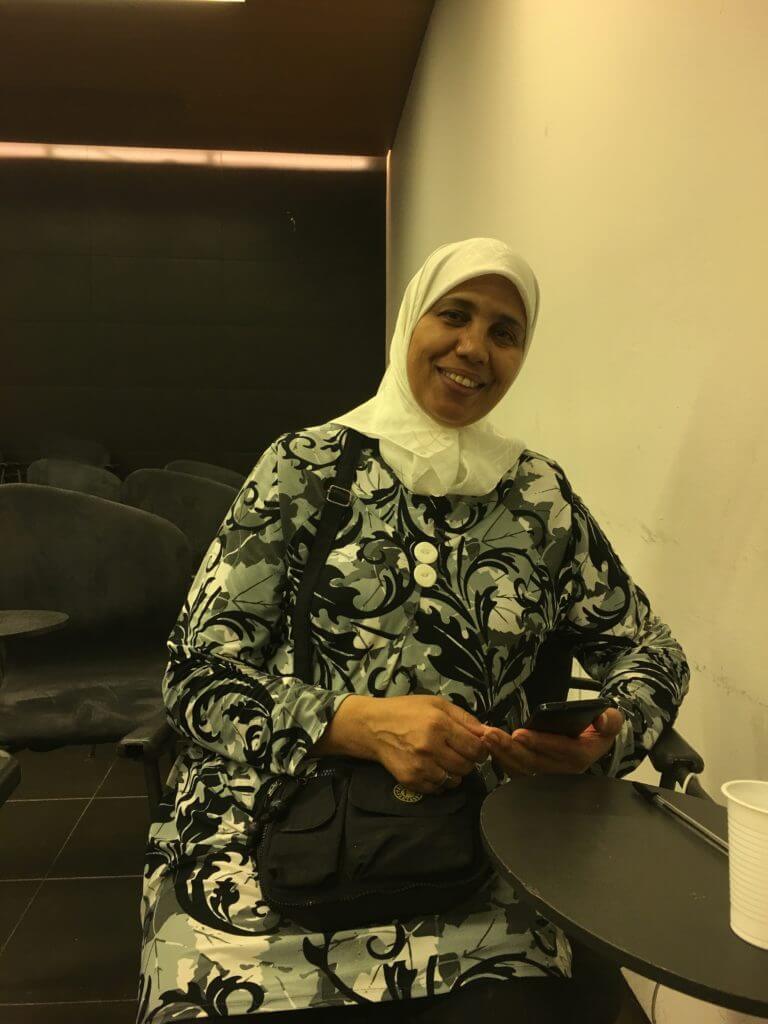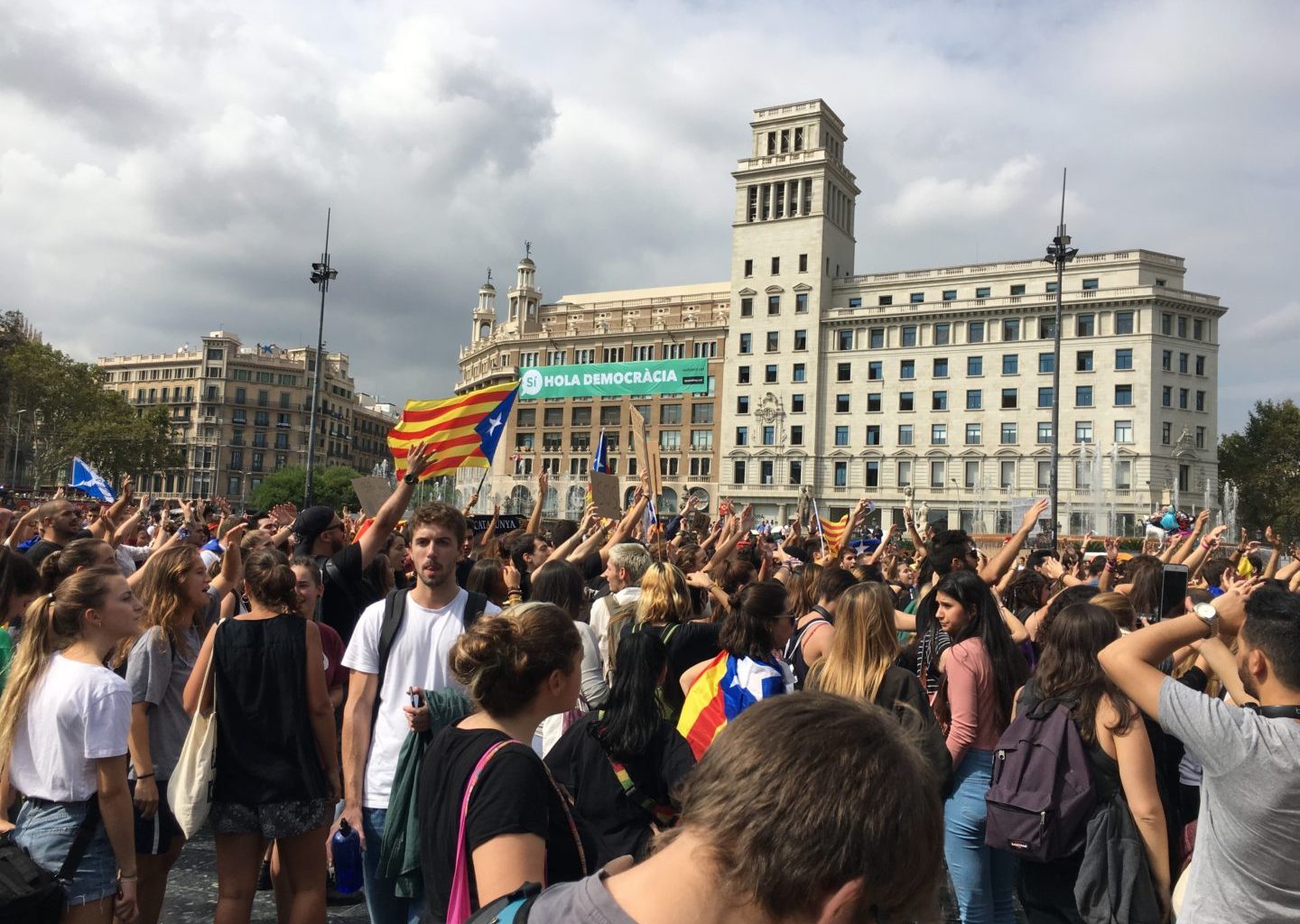Maria Dolores Hernandez is an unlikely rebel. The 94-year-old Catalan great grandmother walks with a crutch, and has spent her long life keeping on the right side of the law.
But at 9am on Sunday morning, Hernandez defied the Spanish authorities – by joining the crowds outside her local polling station, at a language school in Drassanes, a stone’s throw from the touristic Ramblas in the heart of Barcelona.
“I had to come. It is our right,” said Hernandez as she waited patiently to vote in Catalonia’s banned independence referendum. Her daughter, also called Maria Dolores, 67, nodded her head.
“I was a student in Franco’s time. Now we have to fight for our democracy,” she said, referring to the dictator who died in 1975, ushering in Spanish democracy.
That democracy looked fragile this weekend as Spanish police, often in riot gear and balaclavas, seized ballot boxes from polling stations across this region of 7.5 million people. Rubber bullets and batons were used. Over 840 people were injured.
In the end, more than two million voted, with over 90 per cent in favour of independence. The Catalan government has called for international mediation.
Spanish authorities had warned that they would not stand by while the Catalan government held a vote that Madrid had deemed unconstitutional. But many in Catalonia were shocked by the scale of the police response. On Monday, protests took place in Barcelona.
‘I didn’t expect to ever see this. I lived very happily with my husband, my daughter and my son in Barcelona. I never thought I would see this,” said Hernandez, as she watched a video on social media of police firing rubber bullets at voters on the other side of the city.
“We don’t like violence. This moment for us is crazy,” her daughter added.
The pair had already been waiting to vote for over two hours in a bare classroom, along with around 20 elderly people. Independence supporters had ushered them in from the damp Catalan morning as fears mounted of an imminent police attack on the polling station.
“We are a little bit frightened. There are old people, children, pregnant women. What if the police try to push through them?” said Gemma Verdes, director of the language school.
Outside, a crowd of more than one hundred independence supporters chanted “No Temin Po” (‘we are not afraid’). Inside, the older voters sang nursery rhymes. “That way if the police come they can’t do anything. We are just singing children’s songs!” one told me, with a furtive smile.
A few minutes later, the same woman showed me a photo on Twitter of a middle-aged woman, blood streaming done her face. “Look what the police are doing,” she explained. She was visibly frightened.
Officially voting in more than 2,000 polling stations began at 9am on Sunday morning but by midday only a handful had voted at Drassanes due to technical problems. Among those who did manage to cast a ballot was Faouzia Chati Badou. “I was the first person voting here,” the Moroccan-born mother said with pride.

Like many others across Catalonia, Badou had slept in the school on Saturday night, in an attempt to prevent local police sealing off the polling station. She would not leave until midnight on Sunday, or even later.
“We have to stay here to take care of the boxes, to protect this vote,” said Badou. “We just want democracy, and independence for Catalonia.”
The pro-nationalist government in Barcelona had said that if Catalans voted ‘yes’ independence would be declared unilaterally. Whether this happens is unclear.
But Spain’s gravest political crisis since a failed military coup in 1981 seems set to deepen.
Liz Castro, an American writer who lives in Barcelona, said that the Spanish reaction to the Catalan vote would only increase demands for a binding referendum, and for independence.
“You can’t keep a people against their will,” said Castro, author of books on Catalan independence.
“It’s really incredible that in the 21st century a country like Spain that is supposed to be democratic brings out riot police and paramilitary police out on people who want to vote.’
“It’s horrifying. Old women, blood. These are just people who want to vote.”
On Sunday, the Spanish government showed no sign of regretting the decision to send in the Guardia Civil, a military-style police with a controversial history in Catalonia. Afterwards Spanish premier Mariano Rajoy thanked the police for acting with “firmness and serenity” as they attempted to halt the poll.
But Madrid’s response has provoked international revulsion. Belgium’s prime minister, Charles Michel said: “Violence can never be the answer!”
Scotland’s First Minister, Nicola Sturgeon, called on the Spanish to “change course before someone is seriously hurt”.
Voting did take place in many parts of Catalonia. In some neighbourhoods, hundreds queued peacefully around the block for hours to vote, often cheering as they emerged from the polling stations with their arms held aloft.
“I have seen the violence on TV. I’m against it,” said Elena Bayona, 21, as she waited in line outside a school on the outskirts of Barcelona. Her father, Pedro, had watched our 2014 referendum with envy.
“We want what Scotland had. There is a big difference between the United Kingdom and Spain. You recognised democracy,” he said.
There was a sizable Scottish contingent in Catalonia for the vote, including SNP MPs Joanna Cherry and Douglas Chapman, part of a cross-party international parliamentary delegation observing the referendum. Elsewhere, independence supporters Marty Smith, 26 and Tam Wilson, 25, came “to show solidarity”.
As expected, those who did go out to vote were overwhelmingly pro-independence. But Catalan opinion is far more divided than the rows of starry independence flags hanging from the balconies of Barcelona’s winding streets might suggest. At least half of voters would like to remain part of Spain, according to polls.
“Spain is our nation and Catalonia is part of Spain,” said Carla, who took part in a major anti-independence rally in Barcelona on Saturday. “Spain is a family and Catalonia is part of that family”.
Met plenty of anti independence supporters in Barcelona too. ‘Spain is a family. Catalonia is part of that family’. None said they’ll vote pic.twitter.com/Bf4PwNNHrJ
— Peter Geoghegan (@PeterKGeoghegan) September 30, 2017
Despite the violent scenes elsewhere, most of Barcelona was notably calm during Sunday’s vote. On the main streets, the tourists that so much of the city depends upon ambled in the light rain seemingly unaware of the political turmoil so close to hand.
Mr Kumar’s souvenir shop on the Ramblas sells Catalan flags and pro-independence merchandise, but personally he would “leave things as they are”.
“Starting a new country isn’t easy, it’s very expensive. Is it worth it?” asks the businessman who came to Barcelona from India.
Some independence supporters say Catalonia would be a richer, more prosperous place outside Spain, citing the region’s relative economic strength and trading ties. But for many others the question of independence goes beyond money.
The Franco-era laws against the Catalan language are long gone, but a sense of cultural grievance remains. “My father couldn’t speak Catalan at school. We still feel that difference,” says Anna Jane, 36, just minutes before polling opened at a school in Gracia, a neighbourhood of traditional tight streets and open squares just north of Barcelona city centre.
Jane, a teacher with a four- year-old son, believes that regardless of the result of Sunday’s vote, the Spanish reaction will only increase the Catalan appetite for going it alone.
“Thanks to this government in Madrid more and more people support independence. That will only continue.”
A version of this story appeared first in the Daily Record on 2nd October 2017.














